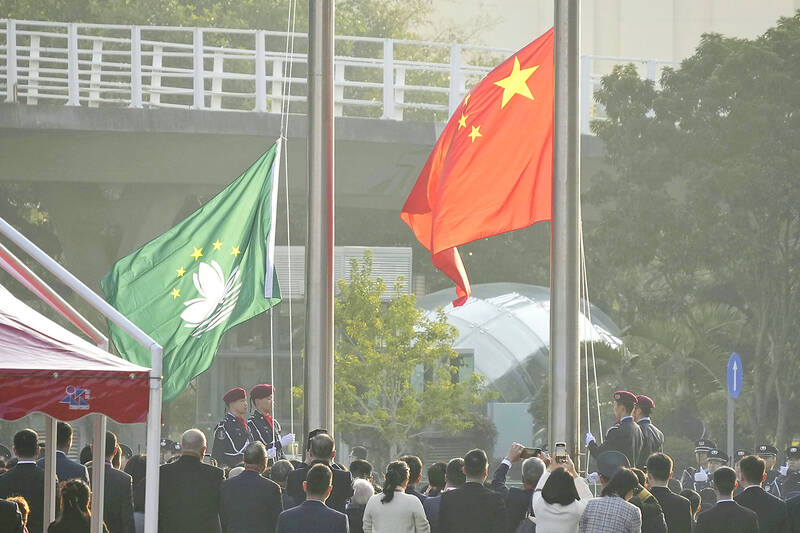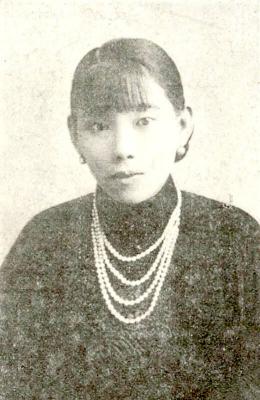When Portugal returned its colony Macao to China in 1999, coffee shop owner Daniel Chao was a first grader living in a different world.
Since then his sleepy hometown has transformed into a bustling gaming hub lined with glittering casinos. Its once quiet streets are now jammed with tourist buses. But the growing wealth of the city dubbed the “Las Vegas of the East” has not brought qualities of sustainable development such as economic diversity and high civic participation.
“What was once a relaxed, free place in my childhood has become a place that is crowded and highly commercialized,” said Chao.

Photo: AP
Macao yesterday marked the 25th anniversary of its return to Chinese rule. Chinese President Xi Jinping (習近平) is visiting the city for three days and the city is festooned with celebratory banners and other decorations. A fireworks display is planned for next week.
Since 1999, the city of 687,000 has transformed from a monopoly-driven gambling enclave into the world’s biggest gaming hub, packed with mainland Chinese tourists. Its GDP per person has more than quadrupled to US$68,000, roughly on a par with Denmark and Australia and surpassing Hong Kong’s of about US$50,000.
China rules Macao under a “one country, two systems” arrangement similar to its governance of Hong Kong, a former British colony. Macao is the only Chinese city where casino gambling is legal and it has resorts run by affiliates of the American gaming giants MGM Resorts, Las Vegas Sands and Wynn Resorts.
Since Macao opened its casino market following the handover to Beijing, its economy has grown to US$46 billion last year from US$6.5 billion in 1999, despite economic slumps during the COVID-19 pandemic and a crackdown on the junkets that have facilitated visits by high-roller gamblers from elsewhere.
The economic growth has come at a cost.
CASINO SHIFTS
Chao’s mother worked at a casino job that brought better pay and a bigger apartment, but also stress and irregular hours. He remembers doing homework at 5am, after her night shift. When he was working as a teacher, his students often went to sleep late or had to rely on paid tutors because their parents also worked casino shifts.
The city’s tourism boom has brought years of easy money that gave its businesses scant incentive to strive to improve their products or services and develop the resilience needed to overcome the hard times of the pandemic and competition from mainland Chinese products, Chao and some other residents said.
Chao has considered leaving the city, but opted to stay.
“Leaving must come at a heavy price,” he said, adding that “it seems Macao isn’t exactly unlivable yet.”
The ruling Communist Party’s agenda for Macao now holds sway, with city leaders often referring to national plans. That’s a marked shift from the past, when the city rarely felt any direct impact from Beijing, said Ieong Meng U, a professor at the government and public administration department of the University of Macao.
He expects Macao to become increasingly integrated with nearby Guangdong province over the next decade, following plans to promote tourism, Chinese medicine, finance, technology and exhibitions.
China has designated a special zone on Hengqin island in neighboring Zhuhai city, jointly run by Guangdong and Macao, that is planned to have about 120,000 Macao residents by 2035.
The closer economic ties have coincided with more intrusive political controls, especially after huge anti-government protests in Hong Kong in 2019 that led Beijing to crack down on virtually all public dissent.
DECLINING PRESS FREEDOM
A vigil commemorating China’s bloody 1989 military crackdown on the Tiananmen Square pro-democracy protests was banned. Pro-democracy figures were barred from running in Macao’s 2021 legislative elections. Last year, the city toughened its national security law. In November, Macao Journalists Association expressed concerns over signs of declining press freedom, saying some local media outlets have been asked to withdraw their articles due to political pressure.
Activist Jason Chao, no relation to Daniel Chao, decided to leave.
After years of working to promote greater democracy, he grew frustrated by officials’ lack of willingness to change and the tendency of Macao residents to rely on solving problems through seeking Beijing’s help or personal connections rather than civic participation, a habit he says partly stems from the city’s colonial heritage under Portuguese rule.
“I exhausted the tactics I had learned at that time,” Chao said.
In 2017, Chao left to study overseas. He’s now a director of a civil society organization serving Hong Kong immigrants in Britain.
Some older residents believe life has improved in the past quarter century.
Ka Man Chun, a retiree, likes the annual cash handouts, funded by gaming tax reserves, that the government has given residents since 2008. This year, each permanent resident received $1,240,
Ka says he feels safe since he steers clear of politics.
“Twenty-five years have passed, there’s nothing really bad,” he said.
Macao’s public security, economy and welfare have improved significantly from the colonial era, said Anna Ng, a flower shop owner in her 60s.
Though critics say Macao has failed to diversify its economy, Ng sees signs of progress in the city’s growing exhibition industry and says she’s found new opportunities in cultural and creative activities.
Enid Ieong said she has grown bored with the city’s limited choices for careers and leisure activities and wants to join her boyfriend in Hong Kong. She dreams of living in Hong Kong’s Sai Kung, an area famous for its scenic beauty and beaches.
Ieong mocked the annual cash handout as compensation for what she calls the psychological damage of living in a gaming hub.
“I feel like I was born in a grand mansion, but am only responsible for sweeping the floor,” she said.

Many people noticed the flood of pro-China propaganda across a number of venues in recent weeks that looks like a coordinated assault on US Taiwan policy. It does look like an effort intended to influence the US before the meeting between US President Donald Trump and Chinese dictator Xi Jinping (習近平) over the weekend. Jennifer Kavanagh’s piece in the New York Times in September appears to be the opening strike of the current campaign. She followed up last week in the Lowy Interpreter, blaming the US for causing the PRC to escalate in the Philippines and Taiwan, saying that as

US President Donald Trump may have hoped for an impromptu talk with his old friend Kim Jong-un during a recent trip to Asia, but analysts say the increasingly emboldened North Korean despot had few good reasons to join the photo-op. Trump sent repeated overtures to Kim during his barnstorming tour of Asia, saying he was “100 percent” open to a meeting and even bucking decades of US policy by conceding that North Korea was “sort of a nuclear power.” But Pyongyang kept mum on the invitation, instead firing off missiles and sending its foreign minister to Russia and Belarus, with whom it

The Chinese Communist Party (CCP) has a dystopian, radical and dangerous conception of itself. Few are aware of this very fundamental difference between how they view power and how the rest of the world does. Even those of us who have lived in China sometimes fall back into the trap of viewing it through the lens of the power relationships common throughout the rest of the world, instead of understanding the CCP as it conceives of itself. Broadly speaking, the concepts of the people, race, culture, civilization, nation, government and religion are separate, though often overlapping and intertwined. A government

Nov. 3 to Nov. 9 In 1925, 18-year-old Huang Chin-chuan (黃金川) penned the following words: “When will the day of women’s equal rights arrive, so that my talents won’t drift away in the eastern stream?” These were the closing lines to her poem “Female Student” (女學生), which expressed her unwillingness to be confined to traditional female roles and her desire to study and explore the world. Born to a wealthy family on Nov. 5, 1907, Huang was able to study in Japan — a rare privilege for women in her time — and even made a name for herself in the